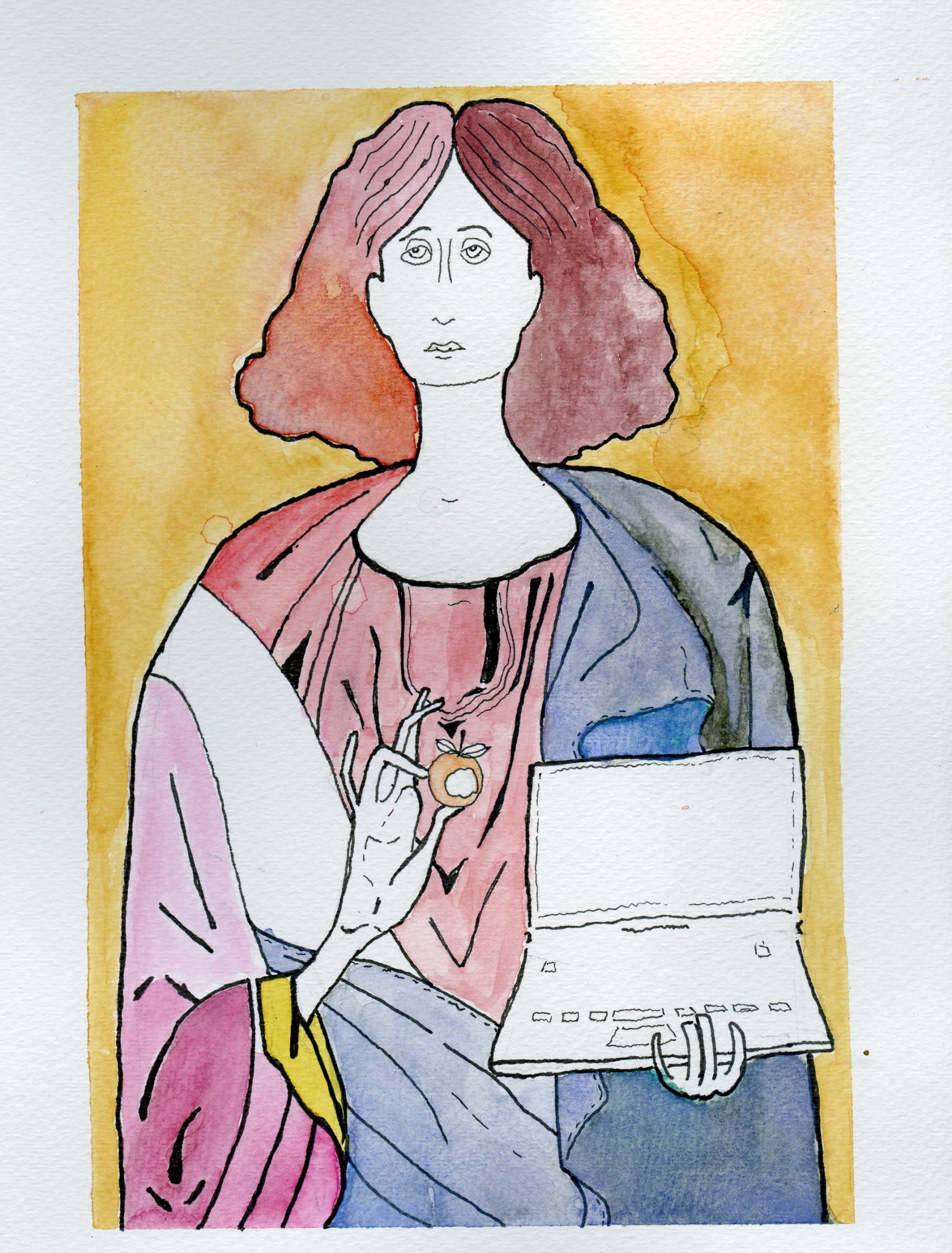Cultivar

art by Robert Gemaehlich.
For their quarter-life crises, Leena’s friends got tattoos and new jobs and engagement rings.
Leena bought a farm.
She wished it was for some thoughtful, bohemian reason, so she could explain herself by saying I was tired of the rat race or I needed to get back to nature.
But really she had thought about giving a landlord half her income for the next seventy-five years and it made her want to jump out the window. Twenty-five and she had no idea what she was doing. No roots. A job she tolerated and no direction.
Fortunately this particular apartment didn’t have windows big enough for her to jump through. So instead she drank wine and stalked cheap houses online. She found a farmhouse with acres of apple orchards in the middle of nowhere, and the panic stopped. I could grow apples.
Later—after she’d closed on the farm—she’d reasoned she didn’t have to grow apples. She was still working remotely. She could leave the successful trees alone, open the orchard for families to pick their own, twenty bucks a peck.
But the empty fields were there, and the greenhouse, and Leena. There was no reason not to grow apples.
She’d always tried to find herself by making things. Paintings, never the way she’d pictured them, something essential lost between her heart and the brush. Bread, which she gave away in the oldest love language: I made this for you. Eat up. Poems, pressed like flowers in a handbound book on her bedside table, every page a slice of someone she used to be.
So this time, Leena went to find herself in her greenhouse, playing matchmaker with pollen and anthers. Oh, Honeycrisp, just wait until I introduce you to Aurora. You’re going to love each other.
How much more rooted could you get than planting a new tree? By planting a thousand, knees in the dirt, putting life in the ground?
Her first crop, fruited four years after she bought the farm, was worthless: ugly, tiny, disgusting. Still, there was magic in making something no one has ever tasted before, even if no one wanted to eat it and you ended up bulldozing every row. She’d edged closer to edibility every year.
Now it was the first week of October ten years into the farm, and the forest was crowned with leaves blown golden by crisp breezes, and her latest crop was ready to pick. Leena came hungry, notebook in hand, to the trees she’d planted over the last decade. She hadn’t found herself in the greenhouse or the orchard, but she hadn’t given up yet, either.
She passed last year’s saplings, too new to bear fruit, slender trunks still deep in their own crises, until she reached the untested field where her newest apples gleamed on their branches.
The foggy, far-off goal was commercialization. Breed an apple they can clone into stores, for thousands of people to pick up and take home. Money would be nice, but it wasn’t about money. It was about creating something you could hold, about putting a piece of herself into peoples’ hands. I made this for you. Eat up.
The first row: gorgeously red, perfect in size, the kind of apple you’d put on a teacher’s desk. The kind of apple that would tempt someone who believed in rules. It came off the tree with a quick snap and a rustling recoil of the branch.
Leena took a bite. Too much skin, like chewing on ribbon. The reward for getting past the skin was sweetness without flavor. She spit it out. She’d learned that the first year: unless it’s good, don’t swallow. There were too many apples to taste to keep the bad ones down. A second bite was an honor she’d yet to bestow.
She tried every tree down the row. Beautiful picture-book apples. Soulless.
She’d bred the next row for patterns, and here they were, pinkish Christmas ornaments flecked with white starbursts. They were so small Leena almost didn’t bother. The taste was all right—like licorice, which she didn’t hate, but would be a tough sell even if she fixed the size. After ten years, she wanted something that would sell.
Third row: a pleasant floral flavor from a mottled orange-brown fruit with a dull rime all over.
Fourth row: good taste, good color, good size. Texture like a styrofoam cup.
Fifth row: Leena hadn’t realized it was possible for an apple to taste like rust, but she had pulled it off perfectly in a dozen trees.
You spent years planting. You scraped together a seed and gave it a home in your earth, fed it light and water and hope. You watched it from your window, watched it up close, as unrecognizable brilliance grew from that tiny pip, leaves sighing open for the sun, pink-petaled poems bursting from branches. You coaxed it into fruit. And most of the time, it came to nothing: a beautiful tree with fruit no one wanted.
This year looked like another failure. The last row—close, but not perfect. She needed perfect. Leena went down the line. Bite. Spit. Try the next one.
The final tree was the runt of the row, thin skyward branches with wrinkled leaves, as though they’d come out too soon. Leena plucked the most beautiful apple she could reach, smooth skin the treeline-yellow of fall’s first leaves.
She bit. Sweet, with the honey taste she’d been hoping for, and a warm note like brown sugar. Good texture, juicy but not mushy, firm but not mealy.
The promise of it bloomed triumphant in her chest. It might not survive the winter, might not fruit again next season, might not come up with the same flavor. But this tree had earned another year.
And in the meantime—she’d dig up what didn’t work, nurture what did, and start fresh. New crosses, new seedlings, new rows. Keep planting, keep making, keep finding. Leena chewed, swallowed, and took another bite.


